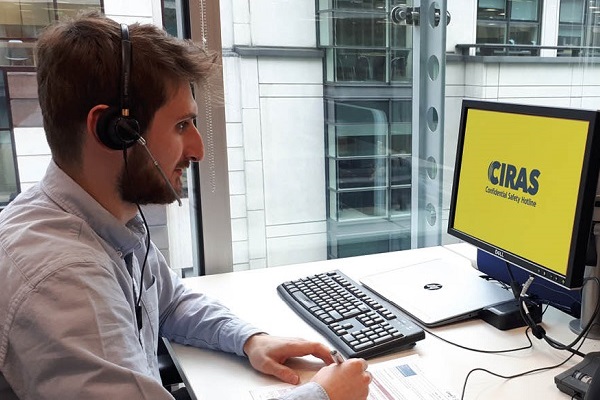Anyone who contacts CIRAS with a health, safety or wellbeing concern speaks to the reporting team. Here the team share their thoughts on listening well to concerns and the difference this makes.

We’d like to introduce ourselves. We are the CIRAS reporting team: Kerry (head of CIRAS operations), Helen and Nik (pictured). If you have recently contacted CIRAS with a concern, you’ll have spoken to one of us, because we always follow up with a phone call. In this blog we’ll explain a little more about why that is and what to expect if you decide to raise a concern.
All three of us are trained to be good listeners. We understand that it can be frustrating to not be heard, and we give you the space you need to talk about your concern. We’re also aware that it can feel uncomfortable raising a concern about your company, which is why it’s important that we’re an independent confidential reporting service. We’re with you and your concern from beginning to end.
We never focus on the ‘who’, because we want to understand why an issue has come about – and how to stop it becoming a safety incident.
Confidentiality is a top priority for many people contacting us and is our top priority too. We take forward your concern in a way that does not risk identifying you or anyone else. If we think details of the concern could reveal your identity, we leave these out of the report. Where there is no way to separate the concern from your identity, we don’t want to leave you unable to speak out, so we’ll point you in the right direction to take things further.
Listening ear
When we speak to you on the phone about your concern, it is your opportunity to fully explain the issues you are experiencing, and for us to listen in complete confidence. We take all concerns seriously and understand that what you are going through may be distressing.
You can have an open and frank discussion with us about how the issues in your concern are impacting your safety and/or wellbeing. As we’re independent and confidential, we hope you’ll be more comfortable sharing details with us than you might be with using internal channels.
Listening to you talk about your concern also means that the report we write up reflects your personal experience of the issue and captures details that internal reporting channels might miss.
We have listened to many, many concerns, and this has given us insight into what transport workers such as drivers, track workers or other frontline staff experience on a day-to-day basis. We are very familiar with, for example, your roster looking perfect on paper but in practice you feel fatigued. We also know that that no two concerns are the same. We’ll ask you questions that dig beneath the surface to uncover the underlying causes. We do this because we want the company to have the whole picture of the issue so they can investigate it to the fullest – and get a good outcome for you.
From speaking to you, we know that reporting a concern can also be frustrating or feel pointless when there isn’t any feedback. That’s why we keep you in the loop throughout the course of your concern and update you on any changes. And you can see that your concern has been listened to and investigated by the response that you receive: we always make sure you get a response.
If you have any safety concerns that you would like to discuss, please get in touch with us by calling our hotline on 0800 4 101 101, using our CIRAS reporting app (available on Google Play and the App Store), or through our online web form.
Find out more
Tags
- Confidential reporting
